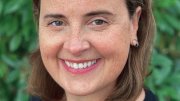Sarah Karmon, the new executive director of the Harvard Alumni Association (HAA), is excited to continue building “an inclusive and interconnected alumni community and really celebrate the impact that Harvard alumni are making around the world.”
She took the helm in January, succeeding Philip Lovejoy, who retired. During her service as deputy executive director, since 2018, Karmon saw the rise of alumni shared-interest groups (SIGs), contested Board of Overseers elections (and new voting procedures), expanded online programming, and the creation of Harvard Alumni Day. She was integrally involved in leading development of hybrid programming and events throughout the COVID-19 pandemic and in the multiple 2022 Commencement celebrations—including the event for 2020 and 2021 graduates, who had virtual ceremonies when campus was shut down. Before joining the HAA as senior director of University-wide affairs in 2016, Karmon was chief of staff to Provost Alan Garber. She also served as a special assistant to the search committee that selected Bacow in 2018.
As Karmon begins her new role—formally, as associate vice president of alumni affairs and development—one priority is “supporting and empowering our network of volunteers as they engage their alumni communities,” she says: “really using their dedication and good work as an extension of what we’re able to do from campus.” In addition, she looks forward to developing more programming and activities, especially gatherings later this year related to the departure of University President Lawrence S. Bacow and the arrival of Claudine Gay as his successor on July 1. (She also begins service as a member of the Harvard Magazine Inc. Board of Directors, nominated by the office of the president.)
Otherwise, Karmon is spending the first several months as HAA leader in an active “listening mode.” “Even though I’ve been at Harvard and in the HAA,” she says, “there are questions I want to ask of our team and our volunteers and alumni, and I see supporting the work we are doing now while listening, learning, and then thinking about what that might mean.” Although she is acquainted with the whole organization, of course, its scope is wide: the HAA oversees technological outreach to alumni, Harvard Clubs, SIGs, and alumni events worldwide; and manages College class reports and reunions, and Harvard Alumni Day—now formally separated from Commencement Day and devoted to alumni, reunion activities, and the HAA annual meeting. And through its Board Committee to Nominate Overseers and Elected Directors, the HAA also plays a direct role in University governance.
How all that work gets done has obviously changed a lot during the last three years, she says, notably with the use of Zoom and other online media: “Technology has enabled us to bring Harvard to alumni in a way that makes it very easy for them to engage, and we want to keep that up.” Yet there are questions about how HAA activities might revert to pre-pandemic norms. How can the online engagement that’s been so successful combine with reconvening in-person events? she wonders—“and how we put those two things together is really exciting. For me, our job is to support the alumni community in the ways that are effective and helpful to them,” she adds, “and to help connect them to each other and the institution.”








